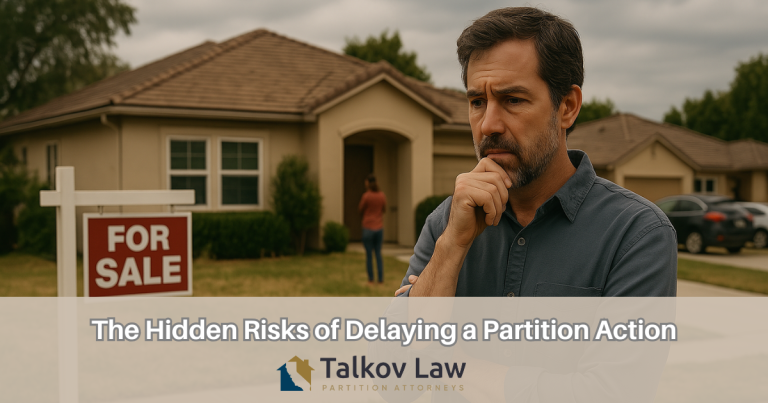Delaying a partition action isn’t just waiting—it’s risking your rights and your wallet.
While some co-owners promptly file a partition action when the relationship has clearly ended, others hang on for hope that something will make the problem go away.
However, delaying a partition action can turn a simple real estate dispute into a legal and financial headache, acting early is often the key to protecting your equity and rights. Partition actions are legal remedies designed to resolve disputes among co-owners of real estate. While these cases can be complex, waiting too long to initiate a partition action can significantly harm your chances of achieving a favorable outcome.
Whether due to hesitation, financial concerns, or hope that the situation will resolve itself, delays can create complications that make the process more challenging, costly, and time-consuming.
Why Delaying a Partition Action is a Bad Idea
Filing soon, rather than later, is almost always the better option when considering filing a partition action. While it may seem easier to avoid confrontation, delaying a partition action often leads to greater conflict, higher costs, and reduced property value. Here are some of the key reasons why acting sooner is almost always the better choice.
#1 – Deterioration of Property Condition and Value
The condition of a co-owned property can decline over time if there is disagreement about maintenance or improvement expenses. Indeed, when a coowner only owns a 50% interest in a property, there is little incentive to pay 100% of the cost to fix the leaky faucet, let alone remodel or improve the property.
Deferred maintenance—such as ignoring roof repairs, landscaping, or plumbing issues—can lead to costly repairs or diminished property value. A delayed partition action means that any proceeds from the eventual sale may be lower, leaving all parties worse off financially. While depreciation may happen slowly, it builds over time, diminishing the value of the investment.
#2 – Increased Risk of Disputes and Tensions
Co-ownership disputes often escalate over time, especially if one party feels they are contributing more to the property’s upkeep or covering mortgage payments while others fail to contribute. This belief in having paid more than one’s fair share can be true even if the paying co-owner is in possession.
Prolonging legal action can exacerbate these tensions, making it harder to reach an amicable resolution. The longer you wait, the more entrenched each party may become in their position.
#3 – Complexity Due to Ownership Changes
Ownership interests can shift over time due to life events such as death or bankruptcy. For example:
- If a co-owner passes away, their interest may pass to their heirs, adding new parties to the dispute.
- Creditors may place liens on a co-owner’s interest, further entangling the case.
Delaying a partition action can mean dealing with a broader and more complex group of parties, prolonging the case and increasing legal costs.
#4 – Accumulated Expenses
The longer you wait, the more carrying costs like property taxes, insurance, and mortgage payments accumulate.
In some cases, one co-owner may bear the burden of these expenses, potentially creating claims for reimbursement against other co-owners. These financial imbalances can complicate the partition process and lead to additional disputes over compensation.
#5 – Statutory and Practical Deadlines
While California law has no statute of limitations on filing a partition action, practical considerations often create time-sensitive scenarios.
For instance, market conditions can affect the property’s value, and delaying could mean missing an opportunity to sell during a favorable real estate market. Additionally, procedural delays caused by court backlogs may extend the resolution timeline even further.
#6 – Loss of Negotiation Leverage
Initiating a partition action promptly can provide significant leverage in negotiations of a co-ownership dispute.
Co-owners are often more willing to reach an agreement early in the process to avoid lengthy and expensive litigation. However, if tensions escalate or additional parties become involved, the chances of resolving the dispute amicably diminish.
#7 – Loss of Documentation and Memories
When co-ownership disputes arise, the parties often have the necessary documentation to prove their claims, such as bank statements, photos, and text messages. By prolonging the action, that information can be lost, thereby hindering the ability to prove offsets.
Avoid the Consequences of Delaying a Partition Action — Choose Talkov Law
Delaying a partition action can lead to increased legal complexity, financial strain, and lost property value—but with the right legal team, these consequences can be avoided. At Talkov Law Partition Attorneys, we focus exclusively on partition cases throughout California, allowing us to resolve co-ownership disputes efficiently and strategically.
With twelve full-time partition attorneys and over 550 partition cases handled, our team understands how delays can impact your financial outcome and works proactively to move your case forward without unnecessary setbacks. When time matters, you need a firm that knows how to expedite results and protect your interests.
If you are deciding whether to file now, or considering whether time will solve your problem, contact Talkov Law Partition Attorneys today at (844) 4-TALKOV to schedule a consultation.







































































































































